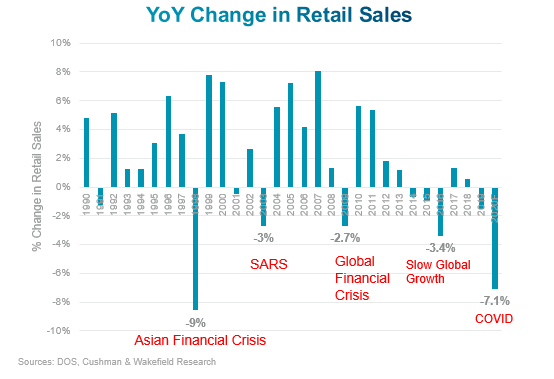Past trends show suburban prime retail rents remain the most resilient in a crisis
Retail sales in 2020 could potentially drop by about 7 per cent, as both tourist and domestic spending took a plunge, said Cushman & Wakefield (C&W) in their latest research. The decline could be even more pronounced than that during the Global Financial Crisis (GFC) and SARS.

In Singapore, tourist spending accounts for about one-fifth of the total retail sales and the extended travel bans effective 24th March on all short-term travel do not bode well for the brick and mortar retail businesses. In addition, the month-long circuit breaker measures could further exacerbate the pain in retail, as footfall in the shopping malls almost come to a halt.
Prime rents have been relatively resilient as the full impact of COVID-19 has not yet fully materialised. At the end of the first three months of 2020, Orchard Road prime rents fell by 1.4 per cent to $35.27 per square foot per month (psf/mo) and Other City Areas fell by 0.6 per cent to $21.63 psf/mo.
Suburban prime retail rents remain resilient during last quarter
As suburban malls continued to remain open for most trades up until the end of March 2020, prime retail rents were resilient during the quarter. It rose slightly by 0.3 per cent to $31.85 psf/mo. Suburban malls are generally more defensive and resilient in nature due to their dominance in the heartlands, and upcoming supply in the suburban locations is fairly tight. In fact, during the GFC, while Orchard prime rents dropped by 15 per cent from peak to trough, suburban prime rents rose by 1 per cent during the same period.
Retail leasing activity during the quarter include Don Don Donki’s 26,000 sf expansion at JEM, Shake Shack’s expansion at 89 Neil Road and Grab Kitchen’s new 6,000sf space take up at 63 Hillview Avenue.
Mark Lampard, C&W’s Regional Head of Tenant Representation said “Beyond Covid-19, international brands, particularly F&B brands, are still considering Singapore to build their presence in this part of the world, provided they can find a suitable store location and reasonable rental rates. Leasing activity from other trades were put on hold when the circuit breaker came into effect; these will resume when the measures are lifted.”
For now, the slew of government stimulus packages is expected to help cushion the impact on retailers, one of the hardest hit sectors since the start of the outbreak. The Solidarity package was the most impactful to retailers, including the co-funding of local employee salaries, a 100 per cent property tax rebate for retail malls or the retail components of mixed-developments. Landlords will have to pass on full property tax rebate savings to tenants, which can translate to around 1 month of net rent. Some tenants are also receiving rental rebates from various landlords on top of the 100 per cent property tax rebate mandated by law.
Given the current disruption from Covid-19 is severe, prime rents are expected to fall across the board in 2020. Due to the absence of tourists in the months to come, Orchard Road will see the largest impact on rents which could fall by about 10 per cent in 2020. With circuit breaker measures in place, Other City Areas rents including malls in Marina Centre, Newton, Harbourfront will also be impacted as most of the workforce works from home.
Suburban prime retail rents to remain resilient as consumers would still carry on with necessity shopping
Suburban malls are expected to show some resilience, as consumers would still carry on with necessity shopping albeit at a lower frequency. As the impact of the Covid-19 is likely to be more severe than GFC and SARS, significant government intervention has helped to mitigate some of the negative impact. For instance, the deferment of contractual obligations will allow tenants who have been materially affected by COVID-19 to defer rental payments for up to six to twelve months. This will help alleviate tenant’s cashflow issues and will allow most tenants to continue operating over the short term.
The impact of Covid 19 is having a pronounced effect on retail. The online retailers are seeing a surge in demand whereas smaller retailers who rely on point of purchase sales have been halted. This trend is expected to moderate when the economy begins to open up, but this immediate shift in retail is dramatic and likely result in altering of buying habits in the future.
Christine Li, C&W’s Head of Research, Singapore and Southeast Asia said “As consumers continue to stay home, food & beverage retailers have had to shift to a total online presence. This will be a good opportunity to stresstest omni channel strategies and last mile delivery logistics which F&B retailers do not often have the resources to experiment under a business-as-usual model. Done well, some F&B retailers might even consider reducing brick & mortar retail space post Covid-19 having been successful at a more online-heavy strategy.”
Suburban prime retail rents remaining resilient does not mean landlords can be complacent
C&W added that beyond the government’s stimulus package and intervention, retailers and landlords need to accelerate their digital transformation in order to strengthen their resilience as consumer behaviour looks set to change. It has never been more pertinent to explore new business models and initiatives that could enhance consumer experience and loyalty.
Mr Paul Ho, chief mortgage consultant at iCompareLoan, said: ” yes, suburban prime retail rents would probably remain more resilient in this Corvid-19 Circuit Breaker period, which has now been extended to June 1st, than retail rent in prime areas.”
He added, “But this resilience cannot last for an extended period. If landowners who do not scale-up their digital transformation fast enough, it is only a matter of time before strains will start showing up in their business model.”






